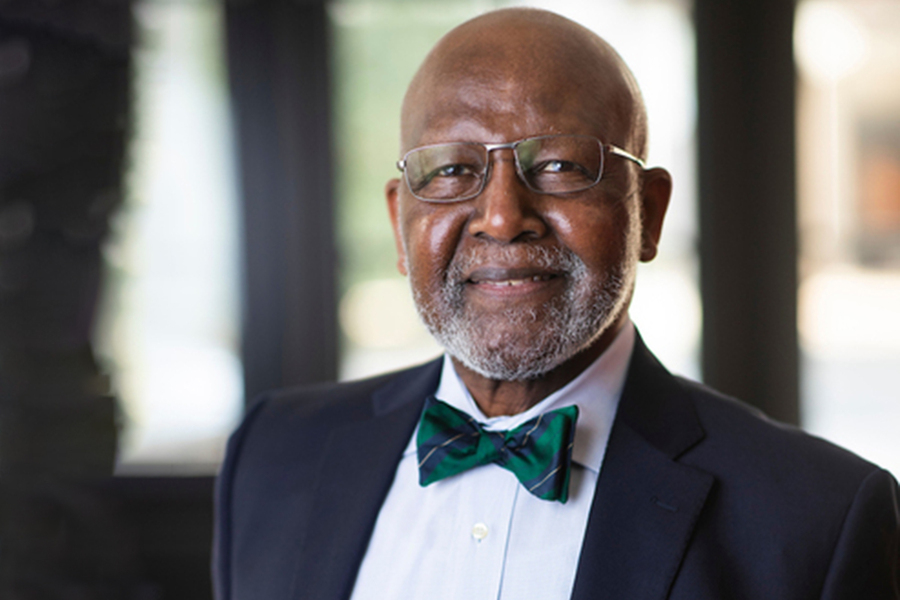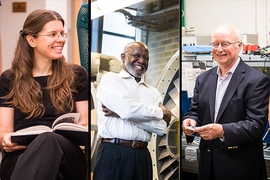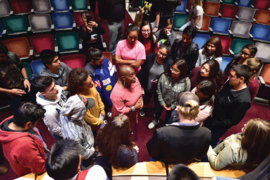This spring, some members of the National Academy of Engineering (NAE) — a group representing the world’s most accomplished engineers — were tasked with electing the institution’s next vice president. MIT’s Wesley Harris emerged as their top choice. Officially announced as NAE’s new VP, Harris will help advance its mission to expand U.S. engineering frontiers while based on MIT’s campus.
“It is a delight to see Wesley Harris celebrated for his substantial achievements as a researcher, educator, and mentor, and I expect as NAE’s new VP, he will continue his legacy of expertly guiding young engineers toward excellence in their fields,” says Anantha Chandrakasan, dean of the MIT School of Engineering and Vannevar Bush Professor of Electrical Engineering and Computer Science.
An impressive researcher and dedicated mentor, Harris is currently the Charles Stark Draper Professor of Aeronautics and Astronautics. He’s spent 50 years advancing technical research by making seminal contributions in a range of engineering fields, building joint research programs between universities, industry, and government, and inspiring young engineers to become titans in their own fields. To his students, for decades, he’s been considered the ultimate mentor.
As NAE’s next VP, Harris will remain at MIT but will be tasked to inspire an even wider field of upcoming engineers. Harris says he expects to forge a deeper connection between two of the world’s leading engineering institutions.
Daniel Hastings, associate dean for engineering, department head at aeronautics and astronautics, and Cecil and Ida Green Professor of Education, says “Wes has been a role model to so many in aeronautics and astronautics. This honor recognizes his impact on engineering.”
In his new role, Harris will work with NAE staff on expanding programs like EngineeringGirl, a national initiative to advance women engineers, and the now-international Grainger Foundation Frontiers of Engineering, a program helping PhD students worldwide build impactful research careers.
Harris will also coordinate new NAE initiatives focused on diversity, both by advancing minority engineers to make the U.S. workforce more inclusive and engaging with more engineering societies globally. One of his goals is “to support engineering as an international enterprise, not just an American enterprise.”
For Harris, working to support diversity is personal. As the founding director of the MIT Office of Minority Education in the 1970s, he understood how important it was for minority students to have support, given his experience as an African-American student during the Jim Crow era being barred from studying physics. Harris pivoted to studying engineering and throughout his career strove to be a visible mentor to minority students, following in the footsteps of his own mentors.
“Wes has a remarkable record of mentorship and has an especially significant record of making a difference in the lives of young African-American students,” says John Junkins, a University Distinguished Professor of Aerospace Engineering at Texas A&M University and one of Harris’ first colleagues in the early '70s. “Wes understands that, while very important, the ultimate repository of knowledge is not a paper, a book, a patent, or a new technology, but rather the elevation of the younger generation that collaborate with the faculty in performing the underlying research.”
Woodrow Whitlow Jr. is an early example of Harris’ campus impact. Harris arrived at MIT while Whitlow was a junior undergraduate student, and after launching a hypersonics research program together, Whitlow stayed through his PhD. After graduating, Whitlow spent a life-long career leading research at NASA, retiring in 2013 with the agency’s highest honor, a NASA Distinguished Service Honor Medal. Today, Whitlow works as special liaison to the technical director at the National Aerospace Solutions LLC, and he still turns to Harris for advice.
“All of a sudden, I had an African-American role model,” Whitlow says. “It was fun working with him. And it was inspirational. I loved to see him and know what he had done, and think maybe I could do something like that, too.”
A decade later, Catherine Mavriplis came to MIT from Canada. Harris took her under his wing, but he left before she finished her thesis. She says he continued serving as her thesis advisor, making time as a mentor while administering programs at universities and NASA. Today, Mavriplis is the Professor of Mechanical Engineering at University of Ottawa, where she’s a distinguished mentor for women engineers. She still fondly remembers how Harris would come into class when she was the only female student in attendance and make a point to address the room by saying, “Hello, gentlepersons.”
As NAE’s VP, Harris will step back from teaching full time at MIT, but continue leading the Hypersonics Research Laboratory. There, he supports graduate students working on challenging projects, including currently exploring novel solutions to avoid blackouts during space communications and less invasive technologies to stop blood hemorrhaging. One of his current PhD students, Carter Waligura, says everyone at HRL is happy to see Harris elected as VP of NAE and eager to see what new research collaborations will come from his appointment.
“I think his biggest strength as an advisor is that he's able to connect you with experts able to give you technical advice,” Waligura says. “Then you could talk with him about what your big ideas are and how to stay on track.”
Harris says he’s honored to serve the nation by connecting bright minds to the world’s top engineers, linking upcoming engineers to NAE members who elected him to do just that.
“I have been informed by the outgoing VP to not forget that I was elected by the membership; therefore, I'm expected to serve the membership,” Harris says. “And the membership, in my opinion, is a collection of outstanding individuals, men and women who themselves have provided service, who have generated scholarship and have developed enterprises with innovative creative entrepreneurs.”









